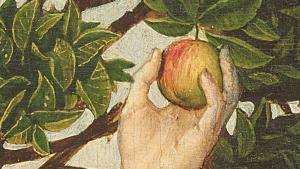
I recently asked friends on social media what they believe about ‘original sin’ and got a ton of different answers. Admittedly, many of my friends are deconstructing their faith, so it’s no surprise that opinions vary, but the breadth of the variety revealed how much uncertainty there is around this topic.
For the sake of clarity, the doctrine of original sin was developed by Augustine of Hippo in the 4th century. Even for Evangelicals, this should mark it as dogma that can be questioned, but it rarely is. The church of my childhood taught me that original sin was rebellion against God, specifically when Adam and Eve ate from the Tree of the Knowledge of Good and Evil.
Now, this presents a problem for thinking believers: with the exception of certain expressions of Evangelicalism in the States, most Christian communities around the world today are comprised of a diminishing group of people who believe in a 7-Day creation (and a 6,000 year-old Earth) and a growing group of equally devoted believers who accept that life evolved rather than appeared fully formed at a divine command, and who therefore read the early part of Genesis as allegorical. As a Progressive Christian, I am fully in line with the second group and, although some of my friends still believe the 7-day bit, they are fewer in number as the years go by.
If we accept that the creation story in Genesis is allegorical, then we have to look at ‘original sin’ allegorically too. What is that story trying to tell us?
The Sin of Self-Judgement
My view is this – the original sin on display in the Genesis narrative is self-judgement. To explain this I need to define judgement itself. 1 Cor 4: 5 reveals that judgement is the assumption of motive:
Therefore do not pronounce judgment before the time, before the Lord comes, who will bring to light the things now hidden in darkness and will disclose the purposes of the heart. Then each one will receive his commendation from God.
In the fulness of time, the purposes of our hearts will be exposed through the process of divine judgement. Only God is equipped to know what motivates us, and in bringing those driving forces to the light, he will provide a platform for us to be reconciled with each other. The Day of Judgement, which I believe will be an era in and of itself, will be a time of reconciliation and healing. However, if you and I assume the motives of others, we are stepping onto ground where only the divine can stand.
We are warned not to judge because it is not safe for us, but this is exactly what Adam and Eve did when they ate from the Tree of the Knowledge of Good and Evil. They strayed onto dangerous territory and were warped by illusory knowledge, considering themselves able to determine what was good and what was evil. Consequentially, the first thing they did with that knowledge was to judge themselves evil.
Their first response demonstrates the extent of the transition they had undergone. Genesis 3:7,
Then the eyes of both of them were opened, and they realised they were naked; so they sewed fig leaves together and made coverings for themselves.
Covering their nakedness was an expression of shame. When God searched for them, they hid, aware of and ashamed of themselves in a way that would previously have been unknown to them. God called out to them, and Adam’s self-judgement and the fear it gave birth to are evident in his response (Gen 3:10):
I heard you in the garden, and I was afraid because I was naked; so I hid.
The illusory knowledge of good and evil causes people to measure themselves against a perceived standard and find themselves wanting. They regarded their own flesh and knew rejection. In those moments, Adam and Eve decided they weren’t good enough, that they didn’t belong, that something was fundamentally wrong with them.
From an allegorical perspective, believing that we can judge good and evil changed humankind’s entire perspective on ourselves, and not for the better.
God had been clear that if humankind ate of this forbidden fruit, we would die. In other words, when we enter judgement, it poisons our hearts, robbing us of a peaceful, easy connection with God, which is a form of spiritual death.
Through the choice to judge ourselves, humankind was cursed. We made ourselves gods, esteeming one person above or below another, pointing the finger of blame at others or ourselves, as indeed Adam blamed Eve. Our hearts were hardened, and our sense of shame was not only born but spread its tendrils into every corner of our lives.
Judgement is the Original Sin
Some say that rebellion was the original sin – that God gave us a command and we didn’t keep it – but for me that is an insufficient explanation, painting God as an arbitrary and merciless keeper of rules. Judgement is the truly consequential original sin – the sin that took us away from peace, from trust and from ourselves.
The Lord told us not to eat from the Tree of the Knowledge of Good and Evil because of the effect it would have on us, not because he likes rules and rule-keeping. If we understand that self-judgement was the first manifestation of the fall, it is easy to accept judgement itself as the central pillar of human rebellion.
In turn, this understanding brings greater depth to our perception of the Gospel, and all that God would free us from.
Note from the author: I wrote a book on this topic, Who Am I To Judge?, which explores judgement of the self, of others, and of God, along with the Day of Judgement itself. It’s published under the pseudonym James Bewley, and is available on all regional Amazon sites.













